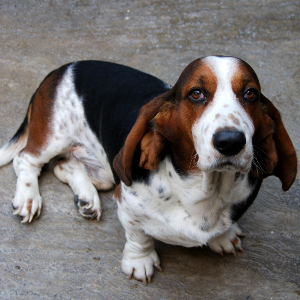
Basset Hound
The Basset Hound’s distinctly floppy ears and droopy eyes may draw you in. But their personality is what you’ll fall in love with. These friendly dogs tend to be calmer than most breeds. And though they’re sometimes hard-headed, you can lessen their stubborn tendencies with rewards-based training and motivational tools.
Interested in discovering if your dog is a Basset Hound?
Check out Wisdom Panel's DNA tests.

Basset Hound Traits
General Appearance
Perhaps one of the most recognizable breeds, the Basset Hound has a signature large, domed head, big paws, long droopy ears, and sad eyes that are covered with a wrinkled brow.
Coat and Coloring
The Basset Hound can be any hound color—including a variety of blacks, tans, and whites. A black saddle may also be possible. Long coats are not acceptable under the breed standard, but some people consider this a desirable trait.
Distinctive Physical Traits
The Basset Hound’s short, stocky stature, long, droopy ears, furrowed brow, and deep, sad eyes are all distinct to the breed..
Basset Hound Temperament
The Basset Hound is an intelligent and gentle breed, devoted to family and well-mannered by nature. Their temperament, though friendly and affectionate—especially towards their masters—can be stubborn and disobedient at times. But overall, the Basset Hound is an excellent and popular pet.
Though most Basset owners find their dogs to be calm and patient while at home, the breed’s hunting instincts can take over when they’re out in nature. Basset Hounds are very keen to follow scent trails, and their stubborn tendencies—combined with their loud bark—can make for interesting outings when they have hunting on the brain. (So, always leash your Basset Hound when in unfamiliar or non-contained areas.)


Basset Hound History
In the 16th century, friars at the Abbey of Saint-Hubert in French-occupied Belgium began developing the predecessor to the Basset Hound.
They sought to create a dog that would be short and agile enough to hunt small game through dense bush, yet slow enough for their human hunting counterparts to keep up. Though the St. Hubert’s Hound that resulted is now extinct, Basset Hounds still share several characteristics in common with their ancestor.
The Basset Hound made its way from France to England in 1866, and it was established in the United States by 1884. The American Kennel Club recognized the breed in 1885, and the Basset Hound Club of America formed in 1935.
Basset Hound Care
Nutrition
Basset Hounds should eat a high-quality diet that’s suited to their particular age, as well as any additional health concerns.
It’s always important to monitor the amount of food and treats that you give your dog. Since Basset Hounds aren’t quite as active as other breeds, they’re more at risk of weight gain. For appropriate nutrition and feeding guidelines, consult your veterinarian.
Grooming
Though the Basset Hound does have a short coat, the breed actually sheds frequently. So, regular grooming is important. Using a shedding tool at least once a week should help keep stray hairs at bay.
It’s also wise to clean a Basset’s ears weekly and ensure that their ears dry out fully. Likewise, check their eyes often, since their droopy nature makes it easy for debris to collect.
All dogs require regular dental care, including at-home teeth brushing and professional dental cleanings, and the Basset Hound is no exception. Maintaining good dental hygiene is important for their overall long-term health.
Exercise
Basset Hounds tend to be more laid back and less active than other breeds. But they do still require daily exercise to stay healthy. A moderate walk will usually do the trick, as will games that you can play together.
Training
The Basset Hound is a loyal and intelligent breed. But their stubborn, independent streak can get the best of them when it comes to training. Early and reward-based training with motivational tools—such as treats and favorite toys—can help. With the proper patience, this breed makes an excellent pet.

Basset Hound Genetic Health Conditions
-
Chondrodystrophy (CDDY) and Intervertebral Disc Disease (IVDD) Risk
Chondrodystrophy (CDDY) is a skeletal disorder characterized by shortened limbs and abnormal early degeneration of the spinal discs, or intervertebral disc disease (IVDD), which predisposes to disc herniation.
-
Craniomandibular Osteopathy (Discovered in the Basset Hound)
Craniomandibular Osteopathy (CMO), also known as "lion's jaw," is a disorder of bone growth, with bones of the skull most consistently affected. During the growth period, the jaw bones become swollen and thickened, causing pain, drooling, and difficulty eating. The associated genetic variant has been identified in the Basset Hound.
-
Dystrophic Epidermolysis Bullosa (Discovered in the Basset Hound)
Dystrophic Epidermolysis Bullosa (DEB) is a skin disorder that causes skin fragility and blistering, as well as irritations in the oral cavity and esophagus. The associated genetic variant has been identified in the Basset Hound.
-
Thrombopathia (Discovered in the Basset Hound)
Thrombopathia is an inherited bleeding disorder characterized by recurrent nosebleeds, bleeding of the gums, and bruising easily. The associated genetic variant has been identified in the Basset Hound.
-
X-Linked Severe Combined Immunodeficiency (Discovered in the Basset Hound)
X-linked Severe Combined Immunodeficiency (XSCID) is a severe dysfunction of the immune system, that leaves affected dogs prone to infection.
Knowing if your Basset Hound is a carrier or at-risk for these conditions can help you and your veterinarian plan for your pup’s lifelong care. With Wisdom Panel™ Premium, you can get results for over 200 genetic health tests.
Breed Group
Hound
The most common ancestral trait of this group is being used for hunting. Some use acute powers of scent to follow a trail while others demonstrate the gift of stamina as they run down a quarry. Beyond these two common traits, however, generalizations about hounds are hard to come by as the group is comprised of a very diverse lot of breeds.
Resources
https://www.akc.org/dog-breeds/basset-hound/
https://www.prestigeanimalhospital.com/services/dogs/breeds/basset-hound
Reviewed July 26, 2020 by Cindy Elston, DVM, MPH


































